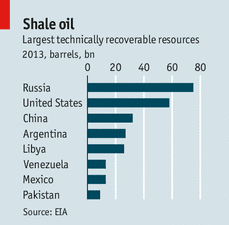Haq's Musings: Shale Revolution Poses Threat to Saudi Economy, Power and Influence?
ر گیس کے ساتھ - اس کے بعد سے جیواشم ایندھن کی طرف سے ایندھن کیا گیا ہے. کول برطانیہ اور امریکہ میں دیسی تھا لیکن یہ انتہائی آلودگی پھیلانے والی ہے اور نظر میں سب کچھ پر کالکھ کی ایک لگتا ہے کہ کوٹ کے ساتھ بہت لندن اور نیویارک کے چھوڑ دیا. تیل نسبتا کلینر جلتا ہے لیکن وہ اس سے زیادہ خاص طور پر خلیج فارس کے علاقے میں، مشرق وسطی میں ہے. سب سے پہلے برطانیہ اور پھر امریکہ خطے کی اہمیت کو دیکھا اور اب بھی مغربی طاقتوں کی فعال حمایت کے ساتھ زندہ رہنے کے جن میں سے کئی کٹھ پتلی آمرانہ حکومتوں کے ذریعے اپنے توانائی کے وسائل کو کنٹرول کرنے کی کوشش کی.
حال ہی میں امریکہ کے ای آئی اے رپورٹسمیت کئی ممالک میں وسیع shale تیل اور گیس کے ذخائر (ٹریلین سے زائد بیرل

پرپاکستان (تیل کی 9.1 ارب بیرل اور گیس کے 105 ٹریلین کیوبک فٹ

، سعودی شہزادہ Alwaleed بن سے سعودی حکومت کے لئے ایک انتباہ حوصلہ افزائی کی ہے طلال. پرنس کی انتباہ معاشی اثرات کے بارے میں ہے، جبکہ میں امریکہ اور سعودی عرب کے اتحاد اور طاقت اور کے لئے اس سے زیادہ وسیع تر طویل مدتی اثرات دیکھ کر سعودی شاہی خاندان کے اثر و رسوخ اس خطے کے زیادہ میں اور باقی دنیا کے.
چوٹی کے دس ممالک کے ساتھ مل کر shale تیل کے ذخائر 345 ارب بیرل ان میں روس (75 ارب بیرل

، ریاست ہائے متحدہ امریکہ (58 ارب بیرل

، چین (32 ارب بیرل

، ارجنٹائن (27 ارب بیرل

، لیبیا (26 ارب بیرل

ہے ، وینزویلا (13 ارب بیرل

، میکسیکو (13 ارب بیرل

، پاکستان (9.1 ارب بیرل

، کینیڈا (8.8 ارب بیرل

اور انڈونیشیا (7.9 ارب بیرل

. اس فہرست میں قابل ذکر امریکہ اور چین دنیا میں تیل کے سب سے اوپر 2 صارفین اپنے دونوں ہونے وسیع shale تیل کے ذخائر ہیں.
سعودی وزیر تیل علی نے Naimi اور ان کے ٹویٹر اکاؤنٹ کے ذریعے اتوار کو شائع دوسرے سعودی وزراء، کرنے کے لئے ایک کھلے خط میں، پرنس Alwaleed اوپیک کے رکن ممالک سے تیل کی مانگ میں "مسلسل کمی میں" تھا. انہوں نے کہا کہ تیل پر سعودی عرب کی بھاری انحصار کے مطابق، دنیا کا سب سے بڑا خام تیل کی برآمد اس کی معیشت کو متنوع کرنے کے لئے "فوری اقدامات" پر عملدرآمد کرنا چاہئے کہ "واقعی میں بہت سی کے لئے پریشانی کا باعث بن گیا ہے کہ ایک حقیقت" تھا، اور انہوں نے کہا کہ ذرائع ابلاغ کی خبروں کی رپورٹ .
پرنس ان کی وارننگ جاری ہونے کے بعد جلد ہی، اوپیک کی طرف سے ایک رپورٹ اس ہفتے کے گروپ کی تیل کی برآمد آمدنی 2012 میں $ 1.26 ٹریلین کے اعلی ایک ریکارڈ مارا دکھایا شائع کیا. تاہم، گروپ کی طرف سے پیشن گوئی کی آمدنی میں سے اس سطح shale تیل سے مقابلہ کے چہرے میں برقرار کیا جا سکتا ہے یا نہیں سے زیادہ شکوک و شبہات پیدا ہوتے ہیں. سعودی عرب میں دنیا کے سب سے بڑے تیل برآمد کنندہ، کیونکہ اب میں کمی صارفین کی مانگ کی اپنی پیداواری صلاحیت سے بھی کم وقت میں پانی کے پمپنگ ہے، پرنس Alwaleed خط میں کہا ہے کہ.
تیل پر انحصار سعودی سعودی حکومت کے بجٹ کا تقریبا 92٪ اس سال کے مطابق، تیل سے آتا ہے حقیقت یہ ہے کہ کی طرف سے حاصل ہوتی وال سٹریٹ جرنل . ریاست ہائے متحدہ امریکہ میں بڑھتی ہوئی shale تیل کی پیداوار سعودی عرب فی دن کے تیل کے 15 ملین بیرل پر اس کی پیداوار کا حجم بڑھانے کے لئے نہیں کر سکیں گے کا مطلب ہے، پرنس Alwaleed ہے. موجودہ صلاحیت 12.5 ملین کے بارے میں BPD ہے، چند سال پہلے ملک میں 15 ملین BPD کی صلاحیت کو بڑھانے کے لئے منصوبہ بندی کی تھی، لیکن پھر 2008 میں عالمی مالیاتی بحران کے بعد ہولڈ پر منصوبہ تیار کیا.
سعودی عرب، قطر، متحدہ عرب امارات اور ایران جیسے تیل کی دولت سے مالا مال خلیجی ممالک مشرق وسطی اور مغربی ایشیا میں ہونے والے واقعات پر اثر انداز ہونے کے لئے ان کے petrodollars استعمال کیا ہے. وہ لبنان، عراق، پاکستان اور شام میں خونی پراکسی تنازعات لڑنے کے لئے ان کے پسندیدہ فرقہ وارانہ گروہوں کی مالی امداد کی ہے. ایران مالی لبنان اور عراق اور پاکستان میں دوسرے انتہا پسند شیعہ گروپوں میں شیعہ حزب اللہ کی حمایت کی ہے جبکہ سعودی عرب پاکستان میں بنیاد پرست سنی گروہوں bankrolled ہے. قطر، سعودی عرب اور متحدہ عرب امارات مصر میں جمہوریت واپس رول کرنے کے حامی مغربی عناصر کی حمایت کی ہے.
سعودی شہزادہ Alwaleed کی اس تنبیہ پر غور اور ان کی معیشت کو متنوع بنانے میں کامیاب کرتے ہیں یہاں تک کہ اگر یہ صحرا کا طویل فاصلے کے دوران اس کی موجودہ طاقت اور اثر و رسوخ کو برقرار رکھنے کے قابل ہو جائے گا کہ بہت زیادہ امکان نہیں ہے. اس کے ساتھ جواب دے گا جو حکمرانوں کے لئے بری خبر بننے جا رہی ہےتبدیلی کے خلاف مزاحمت پر تشدد . لیکن یہ بڑے پیمانے پر سعودی عوام اور عرب اور مسلم دنیا کے لئے ممکنہ طور پر اچھی خبر ہے. یہ مشرق وسطی اور ارد گرد کے علاقے میں مثبت تبدیلی کے نتیجے میں اصلاحات کے مواقع کھلیں گے.
Haq's Musings: Shale Revolution Poses Threat to Saudi Economy, Power and Influence?







 پرپاکستان (تیل کی 9.1 ارب بیرل اور گیس کے 105 ٹریلین کیوبک فٹ
پرپاکستان (تیل کی 9.1 ارب بیرل اور گیس کے 105 ٹریلین کیوبک فٹ